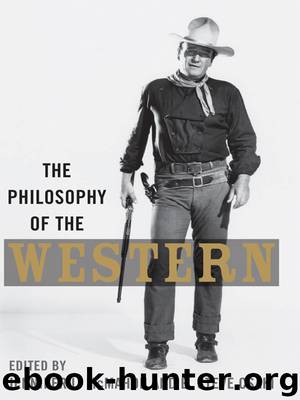The Philosophy of the Western by Csaki B. Steve McMahon Jennifer L

Author:Csaki, B. Steve, McMahon, Jennifer L.
Language: eng
Format: epub
Publisher: The University Press of Kentucky
Notes
1. Hugh Davies, “High Noon Is Tops with Film-Loving Presidents,” Daily Telegraph, August 5, 2003, http://www.telegraph.co.uk/news/worldnews/northamerica/usa/1438073/High-Noon-is-top-with-film-loving-presidents.html (accessed April 16, 2009).
2. Bill Clinton, My Life (New York: Vintage, 2005), 20–21.
3. Immanuel Kant, Groundwork of the Metaphysics of Morals, trans. and ed. Mary J. Gregor (Cambridge: Cambridge University Press, 1998), 4:393–94. All references to Kant's works throughout this essay are based on the Prussian Academy's edition of his complete works. Subsequent references to this work will be given parenthetically in the text.
4. This is an example of what Kant calls an imperfect duty. Kant makes a distinction between perfect and imperfect duties. Perfect duties are proscriptive; that is, they tell us what we ought not to do. Imperfect duties are prescriptive; they tell us what we ought to do.
5. I owe these examples to James Ellington's notes in his translation of Kant's Grounding for the Metaphysics of Morals, 3rd ed. (Indianapolis: Hackett, 1993), 10–11.
6. As Kant makes clear, the moral law is objective. Maxims are the only feature of Kant's moral theory that are subjective.
7. A variant of this formulation is called the Formula of Natural Law. It requires one to “act as if the maxim of your action were to become by your will a universal law of nature.”
8. Kant also refers to this formulation as the Principle of Autonomy. A variant of this formulation is called the Formula of the Kingdom of Ends. It requires one to “act in accordance with the maxims of a member giving universal laws for a merely possible kingdom of ends.” I discuss this variant in the last section of the essay.
9. Christine M. Korsgaard, introduction to Kant, Groundwork, xix.
10. Despite the fact that he himself is also a deputy sheriff, Herb (James Millican) tells the marshal to seek out additional assistance to handle the Miller gang. When the marshal is unable to secure such assistance, Herb concludes that he cannot risk putting his life in danger since he has a family.
11. John Stuart Mill, Utilitarianism, 2nd ed. (Indianapolis: Hackett, 2001), 7.
12. This essay appears as a supplement to Ellington's translation of the Grounding for the Metaphysics of Morals, 63–67. For the facts surrounding the origin of this essay and a quite illuminating analysis of Kant's reply to Constant, I am indebted to Roger Sullivan's Immanuel Kant's Moral Theory (Cambridge: Cambridge University Press, 1989) 173–77.
Download
This site does not store any files on its server. We only index and link to content provided by other sites. Please contact the content providers to delete copyright contents if any and email us, we'll remove relevant links or contents immediately.
The Kite Runner by Khaled Hosseini(5170)
Gerald's Game by Stephen King(4641)
Dialogue by Robert McKee(4389)
The Perils of Being Moderately Famous by Soha Ali Khan(4216)
The 101 Dalmatians by Dodie Smith(3506)
Story: Substance, Structure, Style and the Principles of Screenwriting by Robert McKee(3461)
The Pixar Touch by David A. Price(3431)
Confessions of a Video Vixen by Karrine Steffans(3301)
How Music Works by David Byrne(3259)
Harry Potter 4 - Harry Potter and The Goblet of Fire by J.K.Rowling(3060)
Fantastic Beasts: The Crimes of Grindelwald by J. K. Rowling(3055)
Slugfest by Reed Tucker(2997)
The Mental Game of Writing: How to Overcome Obstacles, Stay Creative and Productive, and Free Your Mind for Success by James Scott Bell(2897)
4 - Harry Potter and the Goblet of Fire by J.K. Rowling(2700)
Screenplay: The Foundations of Screenwriting by Syd Field(2636)
The Complete H. P. Lovecraft Reader by H.P. Lovecraft(2557)
Scandals of Classic Hollywood: Sex, Deviance, and Drama from the Golden Age of American Cinema by Anne Helen Petersen(2515)
Wildflower by Drew Barrymore(2484)
Robin by Dave Itzkoff(2437)
